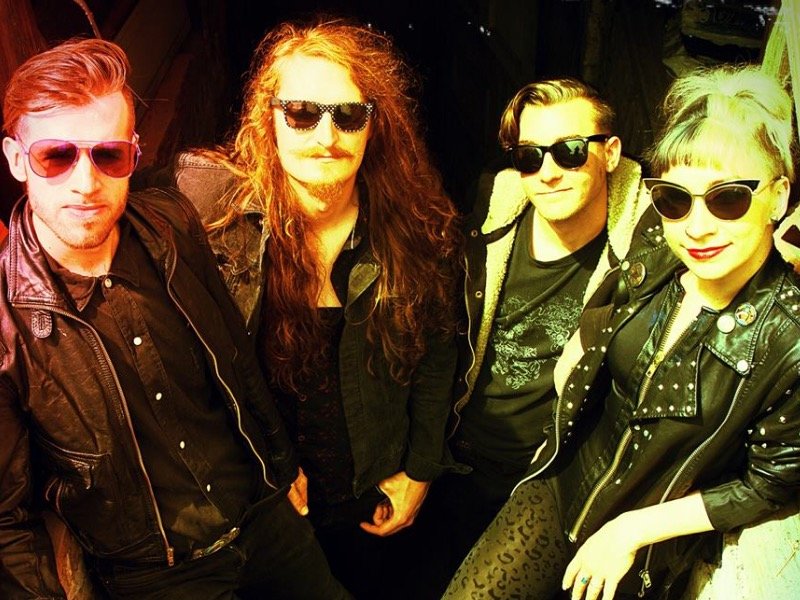There are many ways to describe Milwaukee band Tigernite’s essence and style. Post-glam power pop. Psychedelic fantasy-fueled rock. But, really, there’s only one correct answer.
Wiccan Lisa Frank.
"It’s perfect, and I was mad I didn’t think of it," said lead singer Molly Roberts, laughing. "That was Amy from AWKTOPUS. She interviewed us at the Whitewater radio station; she was talking about the aesthetic that has developed with the music, and she brought it up, ‘It’s kind of like Wiccan Lisa Frank.’
"I wish I had thought of that. It puts a nice bow on it."
Even a description like that struggles to live up to the reality of Tigernite, which has brought its bright, energetic and aggressively fun brand of power pop across the city – from crackling concerts and Present Music to Milwaukee Film Festival afterparties and, for the third year, the massive four-day local musical festival/art education fundraiser Arte Para Todos.
The band will help blast open this year's edition Thursday at 7 p.m. at 88Nine Radio Milwaukee's Walker's Point headquarters. But before then, we chatted with Roberts and guitarist Maxwell Emmet about what educators inspired them, their old tuba and violin days, their upcoming in-the-works album and more.
OnMilwaukee: It is Arte Para Todos time, so was there a particular teacher or class that you remember from your school days that really inspired you?
Molly Roberts: I remember I had an art teacher all the way through grade school – Mrs. Marcum – and I believe she’s still teaching. She taught art in the basement of the school that my grandparents used to go to when it was a one-room schoolhouse. And the art room was the original part of the building, so that was weird for me to realize later on in life that, like, I’m getting an education in the same place my grandparents did – and they were the first generation to receive an education.
But I remember Mrs. Marcum; she taught us how to draw boats or the figure-eight. I will remember her forever. And I had great music teachers all the way through grade school as well. I think singing choral music at a young age has a lot to do with your ability to work as a team. My sister is now actually a grade school music teacher, and that’s something that she teachers her kids with choral work.
Maxwell Emmet: Incidentally enough, my favorite teachers were art teachers. I had some really great art teachers growing up. I was really into drawing when I was a kid and actually didn’t get into music until a little bit later. I don’t remember the exact names of any teachers, but all my art teachers were my favorite teachers, who were kind of the quirky ones. I was a weird kid and they were supportive of that. So when you’re growing up, that’s huge to have somebody supportive in the school.
When did you start getting into music?
Emmet: I started playing guitar in seventh grade, which feels like it’s pretty late. I was in band when I was a kid too; I actually played the tuba, so that was kind of a weird one. But I started playing guitar in seventh grade because of my dad. He’s always been a musician.
Any room for the tuba in future Tigernite songs?
Emmet: No. I mean, we wouldn’t say no if it called for it, but as of right now, no tubas. The craziest we’ve done is keyboards, honestly. We stick to our drum/bass/guitar/singing.
If I read correctly, Molly, you played in the orchestra before you started getting into this?
Roberts: I did! I was a dork and I played violin. And we didn’t have a string program, but my band director was willing to embrace that and brought me in, and I sat with the flutes (laughs). But also then there were other opportunities for youth orchestras in the area, for other schools that didn’t have string programs for those kids to get together and have that experience of music. That was huge.
How much do you see that old violin work in what you’re doing today?
Roberts: I think one of the reasons why I was really drawn to the violin in the first place is because it’s often referred to, in orchestral composition, as being very voice-like. It’s expressive in the same way the human voice is. And that’s part of what I thought was the most interesting.
My parents used to take us – we would take turns with my brothers and sisters – to the MSO, and I remember seeing Frank Almond when I was very young doing a solo recital, as he does, and that being huge. A few months later, I started taking violin lessons after that.
But also I think more of the orchestral arrangement shows up in the music. I loved seeing big choral pieces and the drama of the layering of orchestral music. And I think that’s impressed, that’s tattooed in there forever.
What’s next for you guys?
Roberts: We’re recording right now! We’re going to be releasing a single. Very soon.
Emmet: With a music video.
Roberts: We’ll be putting that out in the next couple of weeks. And then we’ve got about half the songs written and starting to record. Our process is we kind of like to complete one song at a time, so it takes us a little while – from writing it to recording it, all the way through – so we’re simultaneously writing the back half of the record as we’re preparing the front half. Thinking, "what does it need? What does the body of work need?" and coming at it that way.
What’s that process like, building chronologically?
Roberts: It’s different from the first full-length.
Emmet: We don’t have a set way that we really do anything. The first album was a result of us having played songs for going on two years, and we just put down the eight ones that we had the money to afford (laughs). The next album, we wrote and recorded within a month and a half. We just needed to get something out, so we did an EP.
With this one, we don’t have a deadline or anything like that, so we’re building it slowly.
Roberts: When we did "Blood Moon," that was written to be its own little tiny body of work. It wasn’t ever going to be the first half of a 10-song record. It was just supposed to be this little suite of songs that related and went together. I like kind of dipping into writing a rock opera to see what that would be like. And I think the way this one is working out is, once you get a group of three or four songs together, you’re able to start to construct a narrative, whether you like it or not. So I’m kind of waiting to see where it goes, what we feel like is the next act, what needs to happen and responding to it that way.
Is this next album a rock opera?
Roberts: I don’t if we’re going to be able to help it. I think that’s the way we write songs now. I think that’s kind of how it goes (laughs). I’m going to say it’s not, but yeah, I think it will be.
With the songs on "Blood Moon," it wasn’t like, "This is act one and act two and act three." The first two songs came together, the third one made sense – like OK, it’s starting to feel like a body – and we were like, "What do we have to write to wrap it up?" That’s how that came together, so we’re gonna try to stretch that out and try again, see what happens and see if we can get it.
As much as it is a gigantic cliché to say that one has always had a passion for film, Matt Mueller has always had a passion for film. Whether it was bringing in the latest movie reviews for his first grade show-and-tell or writing film reviews for the St. Norbert College Times as a high school student, Matt is way too obsessed with movies for his own good.
When he's not writing about the latest blockbuster or talking much too glowingly about "Piranha 3D," Matt can probably be found watching literally any sport (minus cricket) or working at - get this - a local movie theater. Or watching a movie. Yeah, he's probably watching a movie.







